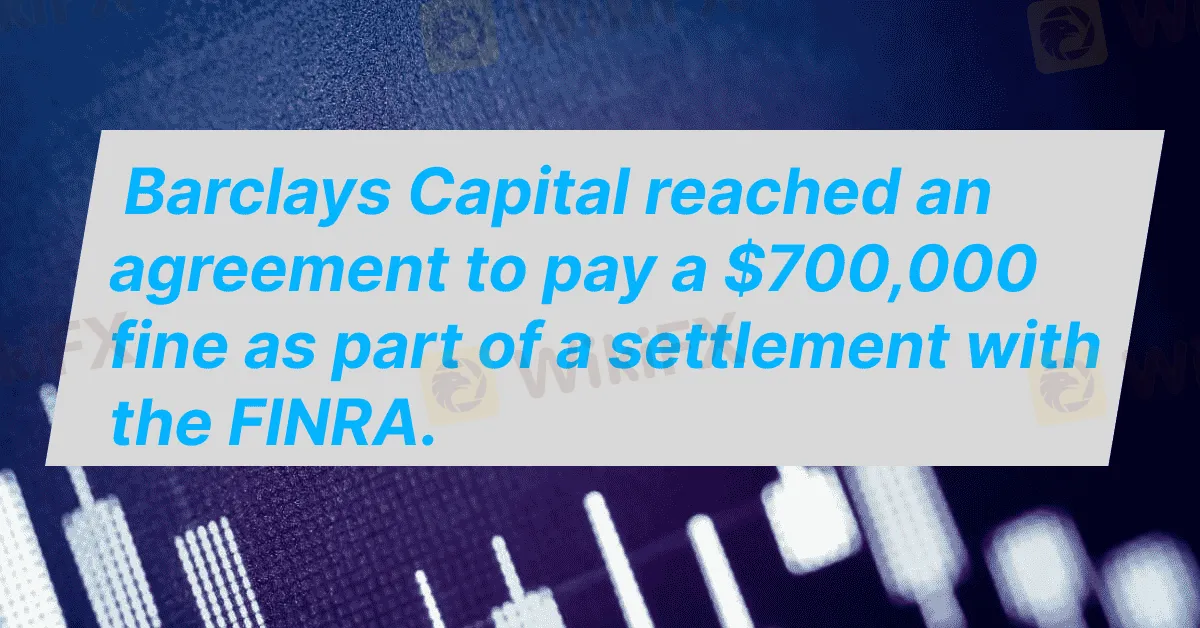简体中文
繁體中文
English
Pусский
日本語
ภาษาไทย
Tiếng Việt
Bahasa Indonesia
Español
हिन्दी
Filippiiniläinen
Français
Deutsch
Português
Türkçe
한국어
العربية
Barclays Capital reached an agreement to pay a $700,000 fine as part of a settlement with the FINRA.
Abstract:The settlement stems from alleged violations of FINRA rules regarding conflicts of interest involving research analysts. According to these rules, firms must have policies in place to prevent analysts from trading securities in a manner inconsistent with their published ratings, and must disclose any financial interests analysts may have in covered companies.

The settlement stems from alleged violations of FINRA rules regarding conflicts of interest involving research analysts. According to these rules, firms must have policies in place to prevent analysts from trading securities in a manner inconsistent with their published ratings, and must disclose any financial interests analysts may have in covered companies.
Between January 2016 and August 2019, Barclays purportedly failed to establish and maintain a supervisory system, including written procedures, to comply with these rules. Specifically, the firm neglected to adequately monitor its research analysts' managed brokerage accounts for compliance with trading restrictions or to ascertain if they held securities in covered companies. This failure resulted in the non-disclosure of analyst-held securities in 99 equity research reports, as well as the oversight of three instances where an analyst's external account manager traded against their published recommendations.
These actions led to violations of several FINRA rules, including 2241(b)(2)(J), 224l(c)(4)(A), 3110(a) and (b)(1), and 2010. Furthermore, Barclays' written supervisory procedures lacked a process to review securities transactions in analysts' external accounts for potential securities law violations, such as market manipulation and insider trading, thus contravening FINRA Rules 3110(d) and 2010.
Additionally, from April 2021 to March 2022, Barclays allegedly failed to gather data for certain clients of its affiliates to determine if disclosure of conflicts of interest was necessary in research reports. Consequently, the firm omitted disclosures in at least 803 reports covering 22 issuers, indicating affiliations and compensation received from issuers within the preceding 12 months, in violation of FINRA Rules 2241(c)(4)(D) and 2010.

Disclaimer:
The views in this article only represent the author's personal views, and do not constitute investment advice on this platform. This platform does not guarantee the accuracy, completeness and timeliness of the information in the article, and will not be liable for any loss caused by the use of or reliance on the information in the article.
Read more

Global Brokers Vs. Indian Rules: Why They Struggle in India
RBI issued a warning last year against 75 forex brokers. Those brokers are globally popular and regulated in other countries, but they are banned in India. Only few brokers even have physical offices located in India. So, why do global brokers face so many challenges in entering the Indian market?

Major Risks Associated with AuxiliumFX: You Need to Know
Risks are attached to every broker you choose—but the question is, do you know what those dangers are? Today, we’ll explain the risks associated with AuxiliumFX—and how this broker could potentially turn you into a victim.

Discover 5 Benefits of Trading with Trive FX Broker
When you decide to finally start trading, the first thing you need to do is choose a broker. While selecting a Forex broker, you should know the benefits you’ll receive by choosing that particular one. In this article, we will discuss the 5 benefits of Trive.

FCA Overhauls Rules on Non-Financial Misconduct in Financial Services
The FCA has launched a new consultation to strengthen rules against non-financial misconduct, aiming to align standards across the financial services industry and bolster public trust.
WikiFX Broker
Latest News
Capital.com Strengthens UK FinTech Ties with Key Memberships
10-year Treasury yield ticks higher as investors eye jobs report
Elon Musk's xAI raises $10 billion in debt and equity as it steps up challenge to OpenAI
Crypto Craze Fizzling Out? Here is Why
Public companies bought more bitcoin than ETFs did for the third quarter in a row
Stock futures are flat after investors sell tech names to start the second half of 2025: Live updates
Social Trading Goes Mobile at M4Markets
ACY Securities Expands Crypto CFD Offering with 24/7 Trading Access
Revelation: Makeup Artist, Social Media Influencer Involved in INR 1.62 Cr Forex Trading Scam
European Central Bank's tightening cycle is done,' chief economist says
Currency Calculator


